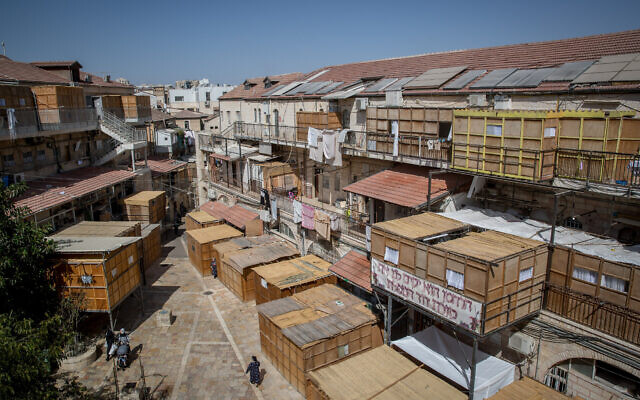
A government report released ahead of the start of Sukkot on Friday evening warned that the ritual huts in which many Jews celebrate the holiday were a “grave danger” for spreading the coronavirus.
The latest Health Ministry figures meanwhile showed 7,639 new infections were confirmed Thursday, a day after a record 9,021 new cases were confirmed.
Another 671 were recorded since midnight, with the number of COVID-19 cases since the pandemic began rising to 255,771.
No new deaths were recorded overnight, with the national toll remaining at 1,622.
According to the ministry, there were 70,660 active cases, with 807 people in serious condition, including 196 on ventilators. Another 268 were in moderate condition and the rest had mild or no symptoms.
The Health Ministry said that 62,248 tests were performed Thursday, 12.3 percent of which came back positive, below the 13-15% daily positive test rates recorded over the past week.
A report from the Corona National Information and Knowledge Center said Israel continued to have the highest number of new infections per capita of anywhere in the world, as well as one of the highest death rates.
With the week-long festival of Sukkot set to begin, it also warned that sukkahs could be a major incubator of the virus.
“The sukkah is largely a closed space and constitutes a serious danger for contagion,” the report said.
During Sukkot, many religious Jews eat meals and sleep in sukkahs that are purpose-built for the holiday. They are usually primitive booths that are at least partially open to the outdoors, with porous roofs made from plant materials and openings for doors and windows.
The warning came after the Health Ministry on Thursday issued a complex set of regulations relating to the spread of the coronavirus during Sukkot, including allowing some crowding in the huts traditionally erected during the festival.
One rule, reportedly worked out between the ultra-Orthodox United Torah Judaism MK Ya’akov Asher and the ministry, designates sukkahs that are “50% open” as outdoor spaces, in which up to 20 people are allowed to gather. This provision was castigated by the Israeli Association of Public Health Physicians, with TV commentators Thursday night asserting that it makes a mockery of an earlier regulation restricting the use of a sukkah to members of the family that owns it, with the threat of fines for violators.
Complicating matters further, another ultra-Orthodox politician, Interior Minister Aryeh Deri, said in TV interviews that the new rule allows up to 20 people to pray in a “50% open” sukkah, but not to sit, eat or sleep in it. It was also not clear what would meet the “50% open” designation.
The news of this complex new provision came amid a growing crisis among Israel’s ultra-Orthodox, or Haredim, who account for a disproportionate portion of Israel’s disastrous infection rate — some 40% of new cases, according to figures released Thursday, from a population that is around 10% of the Israeli demographic. Criticism of the Haredim is growing, with widespread reports saying some are disregarding lockdown restrictions during the High Holiday season, including by continuing to host mass gatherings. TV reports have shown numerous large sukkahs, capable of holding hundreds of people, being constructed in Jerusalem’s ultra-Orthodox Mea Shearim neighborhood.
Ultra-Orthodox communities have been among the hardest-hit by the virus in Israel, with many ultra-Orthodox cities leading the way in new daily infections.
“Even if the percentage of positive [tests] is prominent in a particular sector or age group, the morbidity crosses all sectors, communities and ages,” the Corona National Information and Knowledge Center said in its report Friday.
Israel is under a nationwide lockdown as its second wave outbreak spirals out of control. Health authorities fear holiday gatherings will further spread the virus. Current regulations limit indoor gatherings to 10 people, and outdoor gatherings to 20, including for prayers and protests.
Ministers have approved fines of NIS 500 ($145) for anyone caught in a sukkah that is not their own. It was not immediately clear if the owner of the sukkah would also be fined, or how the rule will affect communal sukkahs.
Israelis are also forbidden from hosting non-nuclear family members in their homes during the holiday.

The government has repeatedly come under fire for issuing confusing, contradictory, and shifting guidelines to the public in its efforts to turn the tide against the pandemic.
Also Thursday, the Knesset Constitution, Law and Justice Committee gave final approval for a new law that heavily restricts demonstrations and bans indoor prayer at synagogues during the ongoing lockdown. The new restrictions went into effect at midnight and will remain in force at least until October 7.
After a massive spike in coronavirus cases, Israel on September 18 entered its second national lockdown, which has seen most shops and businesses shuttered and most Israelis confined within a one-kilometer (0.6-mile) radius of their homes except for essentials like food and medicines.
The lockdown will remain in force until October 14.
No comments:
Post a Comment